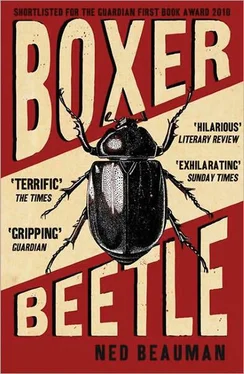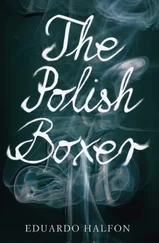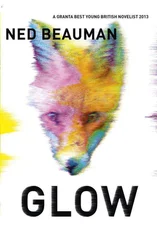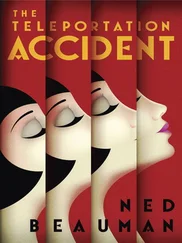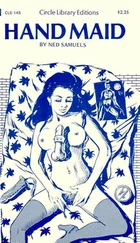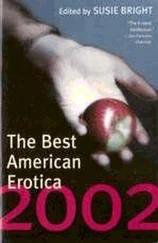Eventually, on the brink of wringing his son’s neck in frustration, he went to Himmler and persuaded him to fund an expedition to Tibet to find Agartha. On his return three months later he claimed to have drunk the blood of a talking panda that he’d shot, met a tribe of women who carried magical stones in their vaginas, and seen the ruins of a gigantic monastery the size of a city. Himmler was fascinated, but the two men fell out over a disputed cocktail recipe and Mowinckel was never again part of the Nazi inner circle. Now he travelled Europe giving lectures and selling books of his poetry.
Erskine chatted with the two men for a few minutes, failing to find a polite juncture to ask for gossip about Hitler, and then went downstairs to find his sister, hayfeverish, blowing her nose in the hall. He accompanied her into the north dining room, where he was dismayed to see that only ten places had been laid out. He’d known the Berlin Olympics would disrupt the conference, but he’d never guessed that attendance would be quite so poor. Were these the only fascists in Europe who didn’t yet despise his father? Perhaps the rest were too embarrassed to admit that they hadn’t been invited to the games either and were sitting at home with the curtains closed and the radio on. That is probably what he would have done in the circumstances.
Circling the room, he counted off the guests on his fingers. ‘You, me, Father, Mother, Bruiseland, Mowinckel and his son, the mad Italian—’
‘He may be mad but he does have some interesting ideas about music.’
‘—and your noble fiancé, which makes nine. Whom does that leave?’
A placecard revealed the final visitor to Claramore to be Edgar Aslet, who was a Tory MP and the most boring human being Erskine had ever met — so boring that he had never been able to fix in his mind even a single detail about the man’s life or achievements. Erskine’s father sat at the head of the table, and he preferred to dine with men he already knew, so he had Aslet on his left and Bruiseland on his right. Erskine’s mother sat at the other end, and she liked to keep an eye on the foreign guests of honour, so she had Amadeo on her left and Berthold Mowinckel on her right. Between them, in the middle of the table, was a more youthful quartet: Erskine next to Morton, and, opposite, Kasimir Mowinckel next to Evelyn. As the wine was being poured, Erskine’s mother said, ‘Now, Mr Morton, is it true that as a Blackshirt you smoke nothing but special Blackshirt cigarettes?’
‘Morton’s not a proper Blackshirt,’ said her husband.
‘I’m afraid that’s right,’ said Morton. ‘I’ve been to a lot of the meetings and I know a lot of the top men. But I’ve decided not to join.’
‘Good thing too,’ said Bruiseland. ‘Those “top men” as you call them — I know one or two myself and before they were Blackshirts they were all rubber planting in Malaya, sheep farming in Patagonia, mining in Kenya. … Failed in England, went abroad, failed abroad, came back to England, cast around for something to do. And then they’re supplemented by a rabble of taxi-drivers and cabinet-makers flinging potatoes full of razor-blades.’
‘My reasons are more to do with their political ideas,’ said Morton. ‘The British Union of Fascists talk a great deal about revolution and dictatorship, which is one thing in Italy, as you know, Signor Amadeo, but quite another thing in England. The English like solidity, stability and banality. Most of the Blackshirts are too young to realise that. But if they carry on behaving with such crudeness and aggression they will set fascism back ten years.’ Erskine noticed that whenever Morton was not speaking Bruiseland seemed to stare very aggressively in his direction, but whenever Morton was speaking Bruiseland seemed to stare very aggressively at a spot on the wall behind Evelyn’s head.
‘Oh, come on,’ said Erskine’s father. ‘All that is beside the point, which is that Mosley is not only an incurably frivolous nightclub-going popinjay, but also a Jew-lover. For a long time he wanted us to believe that he saw sense about the Jews but was too polite to come out and say it. But my patience is exhausted and so is my credulity. I think he’d be happy with a Jew as his deputy.’
‘Attacking the Jews in public does bring trouble,’ said Aslet.
‘You don’t have to attack them, you just have to state the facts,’ said Erskine.
‘For example: that Jewish blood is like a black fog obscuring an Aryan’s knowledge of the magical powers of the runes,’ said Berthold Mowinckel. ‘Interbreeding is the problem.’
‘Well, I’m not sure about runes, but, yes, interbreeding is the problem, as I trust my son will explain in his lecture tomorrow,’ said Erskine’s father.
‘The worst are the aristocrats,’ said Bruiseland. ‘They spend all their money on trinkets and horse-races, their houses start to crumble, so they marry some rich Jewess just for the dowry. And once the Jews have got their claws into the noble families, we’re all buggered. It’s precisely what happened to the Roman Empire.’
‘If a Jew takes a woman’s virtue, but then she finds a good Aryan husband afterwards, their children will still be Jewish,’ said Kasimir Mowinckel.
‘ Halt die Schnauze , Kasimir,’ said Berthold as Bruiseland looked at Evelyn with horrified concern.
‘Fascists are as bad as you, Mother,’ said Evelyn, ignoring Bruiseland. ‘They spend all their time disapproving of other people’s marriages.’
‘Evelyn!’
‘Yes, Evelyn is quite right, and I think there are more important things to worry about,’ said Morton. ‘You know, Bismarck once remarked on how well the children of Jews and Germans seemed to turn out. He said a Semitic mare wasn’t a bad consort for a German stallion and he’d be happy for one of his sons to marry a Jewess. Nietzsche said the same thing. For any Junker type who knows how to obey and command but doesn’t have any real intelligence, he prescribed a daughter of Israel.’ Erskine examined his wine glass.
‘Oh, to hell with Nietzsche,’ said Bruiseland.
‘He does seem to be a favourite of Herr Hitler’s,’ said Aslet.
‘Do you think Hitler has really read Nietzsche on race?’ said Morton as Battle, the head butler, served the soup. ‘Or Gobineau or Wagner or Chamberlain? Of course not. It’s quite obvious that he has read nothing but a handful of cheap pamphlets, the publishers of which he thereafter proceeded to jail.’
‘Nietzsche is indispensable,’ said Amadeo. ‘He shows us that Christianity is just a tumour of Judaism.’
‘What rot,’ said Bruiseland.
As Aslet reached past his steaming bowl for the pepper, a button flew off his shirt and plopped into his soup. Embarrassed, he reached in and then whipped his fingers away with a grunt of pain. ‘It’s like boiling oil!’
‘Oh, I’m sorry, sir,’ said Battle. ‘If you’ll allow me.’ Calmly he plunged his hand into the green liquid and fished around for the button. When he’d retrieved it he dropped it into a napkin and picked up the bowl. His hand had gone bright red but he hadn’t flinched. ‘I’ll dispose of this and get you another portion of soup, sir.’
‘He is a warlock!’ was Berthold Mowinckel’s shrill cry.
‘Oh, no, don’t be alarmed,’ said Erskine’s mother. ‘It’s just how Battle is.’
Battle had been born with a rare neuropathic disorder called congenital analgia which dulled his sense of pain. As a child he had inadvertently bitten off the tip of his tongue and his speech was still slightly indistinct. He was particularly useful at Claramore because he was effectively immune to both powerful electric shocks and accidental discharges of superheated vapour.
Читать дальше
